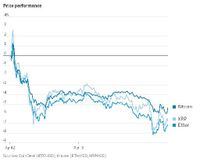Bitcoin and other major cryptocurrencies faced significant declines on Thursday, April 3, 2025, following the announcement of sweeping tariffs by President Donald Trump, which rattled the stock market and heightened fears of a global trade war. The flagship cryptocurrency, Bitcoin, dropped as much as 5% to a price of $81,732.99, according to Coin Metrics, while other digital assets such as Ether and Solana also suffered substantial losses.
As of 10:06 a.m. in New York, Bitcoin had fallen to about $81,770, representing a 4.5% decrease from the previous day. Ether, another prominent cryptocurrency, plummeted by 7%, while the token linked to Solana saw an even steeper decline of 13%.
The broader market was also affected, with the S&P 500 index on track for its worst day since September 2022. Shares of major crypto-related companies were not spared; Coinbase Global's stock fell by 10%, and MicroStrategy's shares dropped by 8%.
Trump's announcement outlined tariffs of at least 10% on various trading partners, with even higher rates for some countries. This move has escalated tensions in international trade and sent shockwaves through risk-sensitive assets, including cryptocurrencies. Ben Kurland, CEO of the crypto research platform DYOR, commented on the situation, stating, "Bitcoin moves at the intersection of narrative, liquidity, and leverage. Right now, it's mostly trading like a high-beta macro asset, tracking real yields, rate expectations, and dollar strength." He added, "It's not about crypto fundamentals today, it's about global liquidity signals and positioning. When real rates dip and the dollar softens, bitcoin breathes."
Despite the recent downturn, Bitcoin has been trading within the $80,000 to $90,000 range for most of the past month. Investors have been closely monitoring the equities market for cues, as there has been a lack of crypto-specific catalysts. David Hernandez, a crypto investment specialist at 21Shares, noted the resilience of crypto markets relative to equities. He stated, "Although the tariff rates were slightly higher than expectations, the announcement provided much-needed clarity on the scope and scale of the policy. Markets thrive on certainty, and with speculation now largely removed, institutional investors may see an opportunity over the coming days to take advantage of compressed valuations."
In the wake of Trump's tariff announcement, Bitcoin experienced a notable decline, dropping from a high of nearly $88,000 just before the news broke. The rapid sell-off came as investors shifted away from riskier assets, reflecting a broader trend in financial markets. Smaller cryptocurrencies like Ether and XRP also faced pressure, each down more than 5% at the time.
Overall, the cryptocurrency market's response to the tariffs highlights the interconnectedness of global financial systems and the impact of geopolitical events on digital assets. As Bitcoin continues to navigate these turbulent waters, market participants are left to ponder the implications of such policy changes on the future of cryptocurrencies.
As the dust settles from the tariff announcement, the immediate future for Bitcoin and its peers remains uncertain. Investors are keenly aware that the landscape can shift rapidly, and the interplay of economic indicators, global trade relations, and investor sentiment will play a crucial role in shaping the trajectory of cryptocurrency prices.
In summary, the cryptocurrency market is facing a challenging environment as it grapples with the ramifications of President Trump's tariffs. The declines in Bitcoin, Ether, and Solana reflect a broader trend of risk aversion among investors, who are now more cautious in light of potential trade conflicts. The coming days will be critical as market participants assess the situation and adjust their strategies accordingly.





